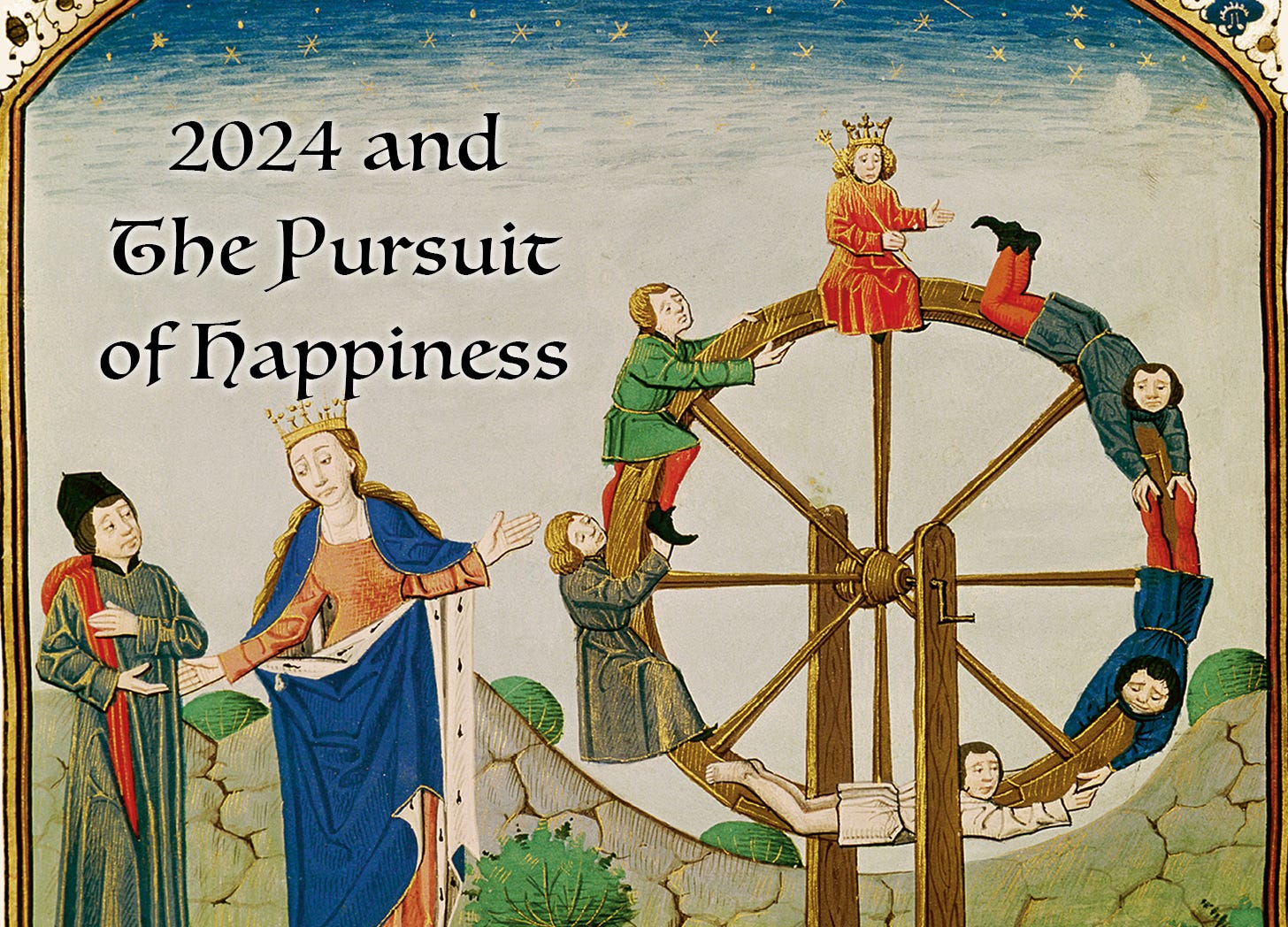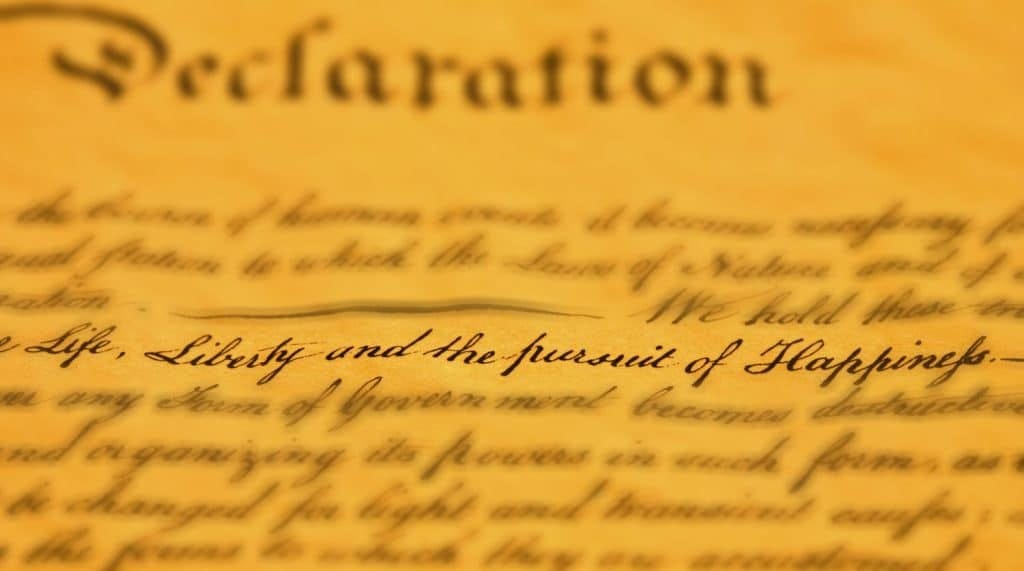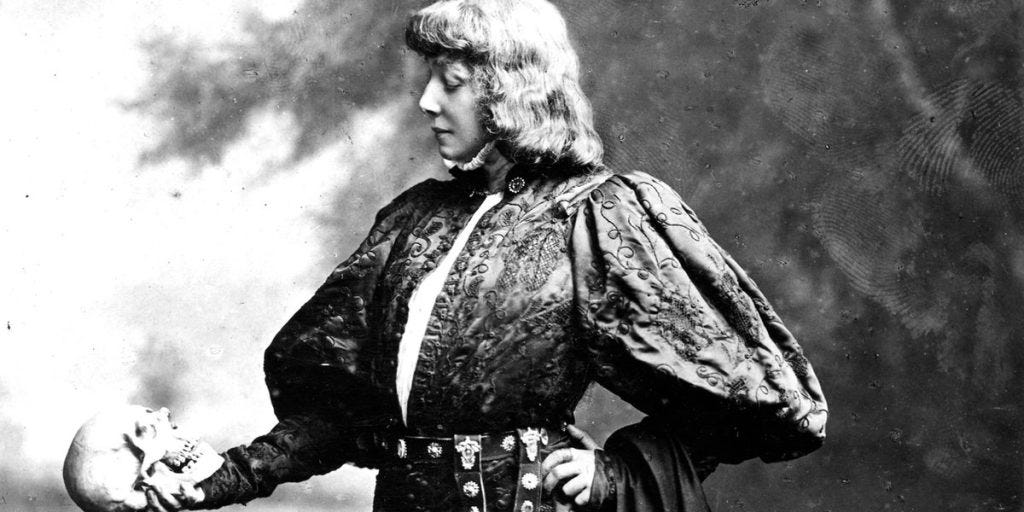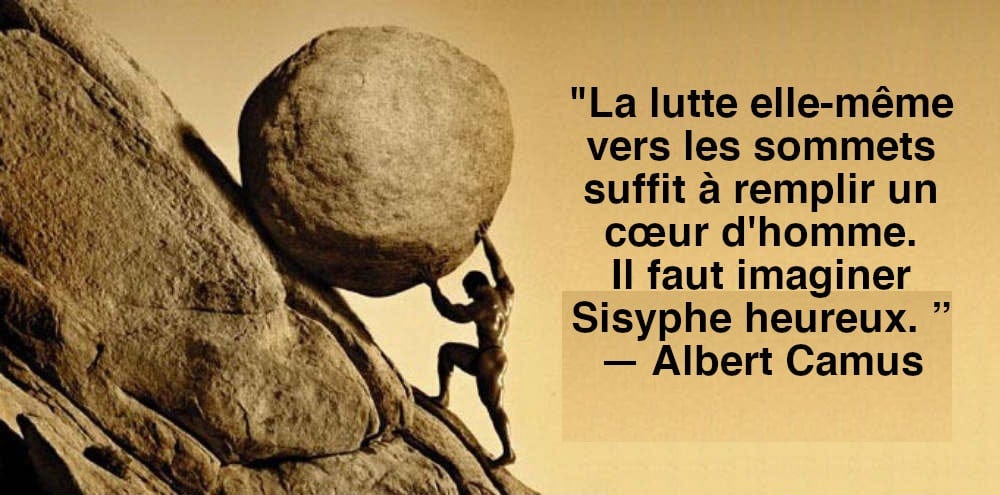by James Corbett
corbettreport.com
February 4, 2023
How arrives it joy lies slain,
And why unblooms the best hope ever sown?
—Crass Casualty obstructs the sun and rain,
And dicing Time for gladness casts a moan.
— Thomas Hardy
Well, here we are. 2024.
The year of the Digital ID.
The year of the CBDC.
The year of the Great Reset.
The year of the Scamdemic Treaty.
The year of the next Great War.
The year of the Polycrisis.
The year of the Deep Fake Selection.
You know: 2024, the year we learn to pursue happiness.
What? You don’t think these problems will afford us the opportunity to pursue our happiness? Then you don’t know what happiness means.
Here, let me explain. . .
The Meaning of Happiness
I'm sure my readers, being a highly literate bunch, are familiar with the Appendix to Nineteen Eighty-Four, where Orwell lays out "The Principles of Newspeak," the "official language of Oceania" that was created to "meet the ideological needs of Ingsoc, or English Socialism." And, if you are familiar with that appendix, then you no doubt recall how Orwell explains that the opening passage of the Declaration of Independence—
We hold these truths to be self-evident, that all men are created equal, that they are endowed by their creator with certain inalienable rights, that among these are life, liberty, and the pursuit of happiness . . .
—would not be difficult to render in Newspeak, but actually impossible.
It would have been quite impossible to render this into Newspeak while keeping to the sense of the original. The nearest one could come to doing so would be to swallow the whole passage up in the single word crimethink. A full translation could only be an ideological translation, whereby Jefferson's words would be changed into a panegyric on absolute government.
"What a delightfully creative bit of science fiction writing!" you might have thought upon reading that passage. "That Eric Blair sure did have some imagination!"
Except, it wasn't fiction.
You see, I recently released the first #SolutionsWatch of 2024 under the title, "How To Be Happy." Of course, the usual gaggle of comment-first, watch-the-video-later types immediately rode in on their high horse to proclaim that happiness is a silly concept and unworthy of pursuit. Now, aside from the fact that this was the very point the people in that video were making, the fact that so many commenters were compelled to chime in with this particular hot take is itself rather revealing. It shows that Orwell's Newspeak nightmare, in which we won't be able to understand the Declaration of Independence, isn't a warning of what might come. No, it's a testament to what has already happened. (Or should that be "hap"-pened.)
You see, "happiness" is one of those words that has strayed so far from its original meaning that we can no longer recognize its roots. In this case, as the Oxford English Dictionary (OED) kindly informs us, both the adjective "happy" and the noun "happiness" are derived from the root word "hap," meaning "chance" or "fortune."
"Happiness," then, is the experience of being favoured by good fortune, as in: "all my lyf hath ben nouryshyd in happynes" (the OED's first recorded usage of the word in English). In the Declaration, then, Jefferson (or is it Thomas Paine?) does not intend to enshrine anything as base as a mere passing physical sensation or emotion as one of the "inalienable rights" endowed on us by our Creator. The founding document of the War of Independence was not predicated on your right to stuff your face with beer and nachos while watching a sportsball game on a widescreen TV.
Rather, the pursuit of happiness is the God-given right for each one of us to pursue our fate, to take our spin on the great wheel of fortune—the Rota Fortunae, that is, not the Pat Sajack version—and to embark on the great adventure of life, whatever hap-penstance may occur.
Hopefully, the penny is beginning to drop for those who have hitherto failed to grasp the significance of this "pursuit of happiness" business.
But what, then, do we make of Solon?
The Pursuit of Happiness
"Count no man happy until he be dead."
This provocative quip, attributed to Solon, the Greek statesman who lived 2,500 years ago, may seem jarring to us. Is he suggesting that life is so horrible that only the dead can truly be happy?
No, of course he isn't. The problem here is that this well-known bumper-sticker-worthy quote is not what Solon told Croesus, the Lydian king whose question about happiness he was answering. According to G. C. Macauley's translation of Herodotus, Solon actually said:
As for thee, I perceive that thou art both great in wealth and king of many men, but that of which thou didst ask me I cannot call thee yet, until I learn that thou hast brought thy life to a fair ending: for the very rich man is not at all to be accounted more happy than he who has but his subsistence from day to day, unless also the fortune go with him of ending his life well in possession of all things fair. For many very wealthy men are not happy, while many who have but a moderate living are fortunate; and in truth the very rich man who is not happy has two advantages only as compared with the poor man who is fortunate, whereas this latter has many as compared with the rich man who is not happy. The rich man is able better to fulfill his desire, and also to endure a great calamity if it fall upon him; whereas the other has advantage over him in these things which follow:—he is not indeed able equally with the rich man to endure a calamity or to fulfill his desire, but these his good fortune keeps away from him, while he is sound of limb, free from disease, untouched by suffering, the father of fair children and himself of comely form; and if in addition to this he shall end his life well, he is worthy to be called that which thou seekest, namely a happy man; but before he comes to his end it is well to hold back and not to call him yet happy but only fortunate.
You can see why this treatise has been reduced to bumper-sticker length.
And you can also now better understand what Solon was actually saying.
But, in case you still can't see his meaning, you can turn to Aristotle, who—in Chapter 10 of his Nichomachean Ethics—spells out how the hap of happenstance may cause us "happiness" and "unappiness" (in the popular sense) as the fickle finger of fate determines, but to call a man "happy" is to judge his life as a whole. The question is not whether this particular moment in time gives us pleasure or pain, but whether, in the great series of adventures from which the grand tapestry of our life is woven, we are able to live in accordance with our virtue, pursuing that which is good and beautiful and bearing our time of ill-fortune and bad luck with equanimity and fortitude.
This is the nature of a "happy life" in Solon's (and Aristotle's) sense, and this is the "pursuit of happiness" that Jefferson (or was it Paine?) was referencing. Not some crass quest for moments of bodily pleasure, but the right to engage in the (not always pleasurable) lifelong struggle to achieve virtue and honour.
Stephen Anderson elaborates in his recent thoughtful article on "Hap & Happiness":
Living by virtue produces a life that is complete and worthy of praise. Living such a life is possible in circumstances, provided that the experiencer responds to them with courage and integrity. The circumstances themselves say nothing of the possibility of blessedness; on their own, they cannot inhibit it in any way, for it depends not on hap (which mayhap in any form), but on the principled commitment of the person to considerations such as duty, decency, and destiny. Anyone may be a hero: their response, not the circumstances themselves, determines it.
In such a sense, then, anybody may be ‘happy’ if he or she so chooses—provided their character ultimately proves adequate to the specific challenge of his or her life. The gods may then look with retrospective approval at one's course, strewn though it be with bitterness and pain. And even in life, one may find it a consolation that one has 'done well', so long as one has lived by virtuous principles with noble patience. All of that continuously remains within the control of the individual. We make our own choices, not of our circumstances, but of our responses to them.
Per-haps you are beginning to grasp the profundity of true hap-piness, properly defined. And, if so, then it's possible that you are finally prepared to appreciate the meaning of that age-old January greeting:
Happy New Year!
OK, it's February now (you know how busy I've been!), but you get the point.
This may indeed be a Happy New Year for each of us . . . but that "happiness" has nothing to do with whatever machinations the Davos/Bilderberger/Trilateral Great Reset cabal are planning to inflict on us.
In fact, our happiness is not for anyone to give to us. Nor is it for anyone to take away from us.
Our happiness is not contingent on comfortable circumstances or pleasurable sensations or material comforts or any other hap-penstance of our fortune.
Instead, true happiness only comes when we walk through the fiery crucible of experience and emerge on the other side with our morals and our dignity intact. Yes, bad things will no doubt befall us this year, but we are not defined by the things that happen to us. No. We are defined by the way we respond to those things.
And, as long as we are allowed to pursue our happiness, there is a chance yet for each of us to look back at the end of our days and reckon ourselves among the fortunate few who have led a happy life.
So, let me (admittedly belatedly) wish you a very Happy New Year! May you continue to pursue excellence in all things, whatever hap-pens.
Like this? Then you’ll love The Corbett Report Subscriber newsletter, which contains my editorial as well as recommended reading, viewing and listening. And this week’s edition contains a subscriber-exclusive video with a very different take on Thomas Hardy’s “Hap.” If you’re a Corbett Report member, you can sign in to corbettreport.com and read the newsletter today.
Not a member yet? Sign up today to access the newsletter and support this work.







